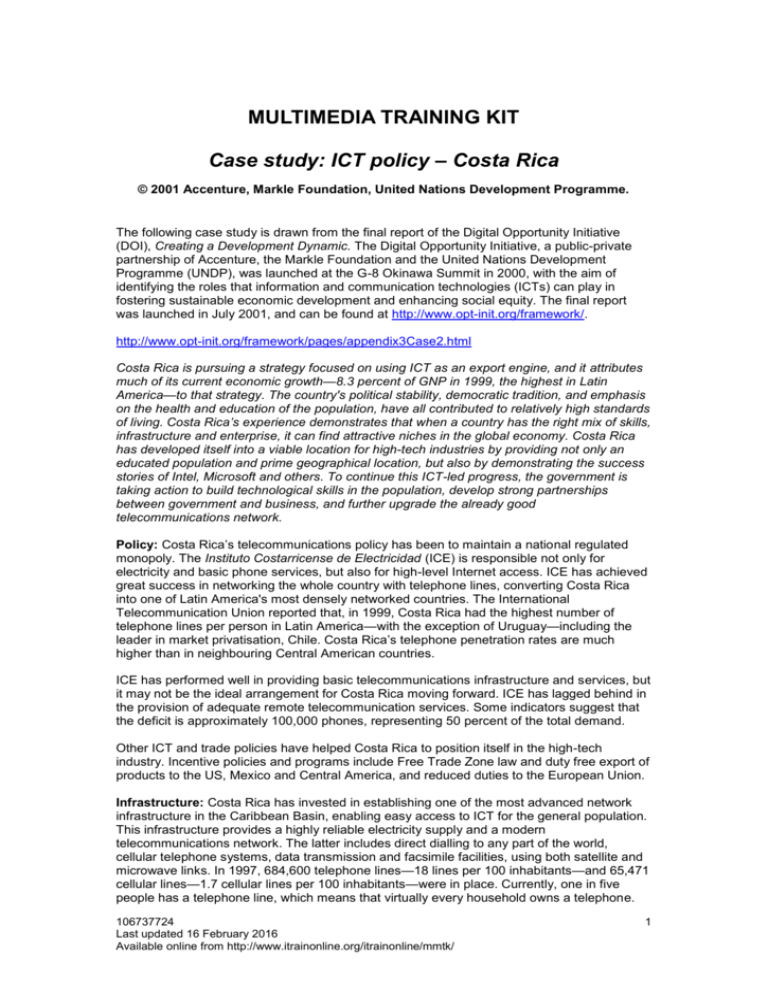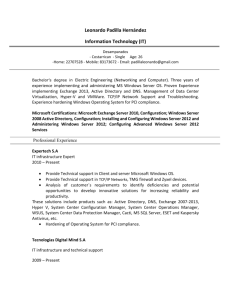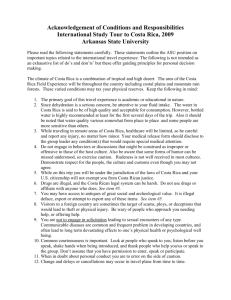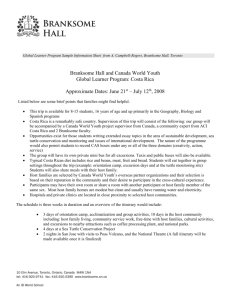Costa Rica - Association for Progressive Communications
advertisement

MULTIMEDIA TRAINING KIT Case study: ICT policy – Costa Rica © 2001 Accenture, Markle Foundation, United Nations Development Programme. The following case study is drawn from the final report of the Digital Opportunity Initiative (DOI), Creating a Development Dynamic. The Digital Opportunity Initiative, a public-private partnership of Accenture, the Markle Foundation and the United Nations Development Programme (UNDP), was launched at the G-8 Okinawa Summit in 2000, with the aim of identifying the roles that information and communication technologies (ICTs) can play in fostering sustainable economic development and enhancing social equity. The final report was launched in July 2001, and can be found at http://www.opt-init.org/framework/. http://www.opt-init.org/framework/pages/appendix3Case2.html Costa Rica is pursuing a strategy focused on using ICT as an export engine, and it attributes much of its current economic growth—8.3 percent of GNP in 1999, the highest in Latin America—to that strategy. The country's political stability, democratic tradition, and emphasis on the health and education of the population, have all contributed to relatively high standards of living. Costa Rica’s experience demonstrates that when a country has the right mix of skills, infrastructure and enterprise, it can find attractive niches in the global economy. Costa Rica has developed itself into a viable location for high-tech industries by providing not only an educated population and prime geographical location, but also by demonstrating the success stories of Intel, Microsoft and others. To continue this ICT-led progress, the government is taking action to build technological skills in the population, develop strong partnerships between government and business, and further upgrade the already good telecommunications network. Policy: Costa Rica’s telecommunications policy has been to maintain a national regulated monopoly. The Instituto Costarricense de Electricidad (ICE) is responsible not only for electricity and basic phone services, but also for high-level Internet access. ICE has achieved great success in networking the whole country with telephone lines, converting Costa Rica into one of Latin America's most densely networked countries. The International Telecommunication Union reported that, in 1999, Costa Rica had the highest number of telephone lines per person in Latin America—with the exception of Uruguay—including the leader in market privatisation, Chile. Costa Rica’s telephone penetration rates are much higher than in neighbouring Central American countries. ICE has performed well in providing basic telecommunications infrastructure and services, but it may not be the ideal arrangement for Costa Rica moving forward. ICE has lagged behind in the provision of adequate remote telecommunication services. Some indicators suggest that the deficit is approximately 100,000 phones, representing 50 percent of the total demand. Other ICT and trade policies have helped Costa Rica to position itself in the high-tech industry. Incentive policies and programs include Free Trade Zone law and duty free export of products to the US, Mexico and Central America, and reduced duties to the European Union. Infrastructure: Costa Rica has invested in establishing one of the most advanced network infrastructure in the Caribbean Basin, enabling easy access to ICT for the general population. This infrastructure provides a highly reliable electricity supply and a modern telecommunications network. The latter includes direct dialling to any part of the world, cellular telephone systems, data transmission and facsimile facilities, using both satellite and microwave links. In 1997, 684,600 telephone lines—18 lines per 100 inhabitants—and 65,471 cellular lines—1.7 cellular lines per 100 inhabitants—were in place. Currently, one in five people has a telephone line, which means that virtually every household owns a telephone. 106737724 Last updated 16 February 2016 Available online from http://www.itrainonline.org/itrainonline/mmtk/ 1 This is radical progress when compared with neighbouring Central American countries where, on average, one in 20 people has access to a phone line. Progress still needs to be made on Internet access—only approximately 100,000 Costa Ricans, or 2.8 percent of the overall population use the Internet—though this is still relatively high when compared to neighbouring countries. Enterprise: Costa Rica has managed to create one of the most attractive investment environments in Latin America for the development of high-tech industries. According to the Minister of Foreign Trade (COMEX), foreign direct investment in Costa Rica is currently US$530 million per annum, or roughly 5 percent of GNP, as compared with US$480 million in 1997. Success in attracting reputable enterprises and entering new global markets, particularly in high-tech, is the result of a concerted effort by Costa Rica to do so. Costa Rica's unique characteristics—its strategic location, political stability, business incentives (including free trade zones), supply of human capital—and its proactive promotion of these assets—have all contributed to investment by high-tech companies in the fields of power technologies, systems integration technologies and call centres. Since 1995, 32 foreign electronics firms have located plants in Costa Rica. These firms include Intel, Microsoft, Lucent Technologies and Siemens. In 1999, computer microchips (mostly Intel) accounted for 37 percent of Costa Rica's exports, compared to bananas at 10 percent and coffee at 5 percent. The balance of trade turned positive due to the dramatic increase in exports (an increase of 20 percent per annum). In addition to the export revenues, Costa Rica has achieved generous pay and stock options for workers, and new standards of efficiency and safety that are being emulated by other local businesses. There are also continuing opportunities for growth and expansion of franchising within Costa Rica. Entrepreneurs, both corporate and individual, appreciate the established business systems and proven track record that selective franchises offer. Franchising is viewed as a way of entering the free market without necessarily possessing extensive knowledge of an industry. The Internet is the primary source of information for local franchisees about potential new franchise opportunities. Approximately 4,000 Costa Ricans are employed by various franchises. Human Capacity: Costa Rica has built on its legacy of supporting an educated population by continuing to build the educational system and emphasize the presence of IT in the curriculum. A tremendous effort has gone into ensuring that education facilities produce appropriately skilled knowledge workers and professionals to contribute to the development of Costa Rica. As early as 1974, the Costa Rican government used Inter-American Development Bank financing to expand the Costa Rican Technological Institute (ITCR) into what has become one of Latin America's most advanced computer science and software engineering schools. The government's dedication to an educated population is also exemplified in the redistribution of expenditures from defence funding to education funding. The results of this effort are easily discernible. In 1999, the illiteracy rate was below 3.5 percent and 18.5 percent of the active population had completed university, technical and para-university studies. Content and Applications: To expand ICT use, the Costa Rican government is creating and providing relevant and up-to-date content on the Internet. One of the best examples of this effort is costaricense.com, the recently launched national portal, which made Costa Rica the first country in the world to offer all of its citizens their own email account in a centralized system. The portal also offers access to a wide range of government services, general information and e-commerce applications, including promotion of the eco-tourism industry. Strategic Compact: Costa Rica attributes much of its recent economic growth to the widespread adoption of ICT. Among the reasons this has occurred are strong political vision, leadership and determination to allocate part of national budget to the development of ICT. Through presidential leadership, the country also actively courted and secured large-scale investments from several multinational corporations. 106737724 Last updated 16 February 2016 Available online from http://www.itrainonline.org/itrainonline/mmtk/ 2







